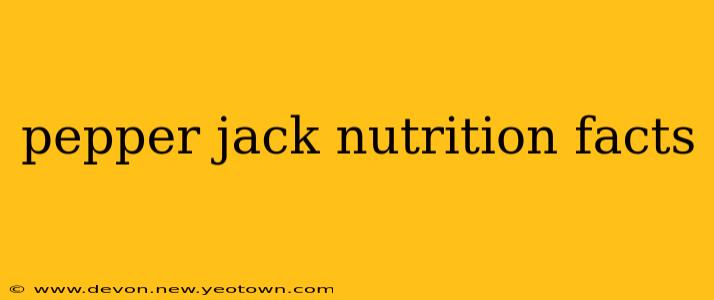Pepper jack cheese, with its fiery kick and creamy texture, has become a staple in many kitchens. But beyond its delightful taste, what's the nutritional story behind this spicy cheese? Let's dive into the details and uncover the nutritional facts of pepper jack cheese.
What are the nutritional facts of pepper jack cheese?
The nutritional content of pepper jack cheese can vary slightly depending on the brand and fat content (e.g., whole milk vs. reduced-fat). However, a general nutritional profile for one ounce (approximately 28 grams) of pepper jack cheese typically looks something like this:
- Calories: Roughly 100-110
- Fat: 8-9 grams (often a mix of saturated and unsaturated fats)
- Saturated Fat: 5-6 grams
- Cholesterol: 25-30 milligrams
- Sodium: 200-250 milligrams (this can be quite high!)
- Protein: 7-8 grams
- Calcium: A good source, around 200mg
- Vitamin A: Moderate amounts
Note: These are estimates, and always check the specific nutrition label on the packaging of the cheese you are consuming.
Is pepper jack cheese high in sodium?
Yes, pepper jack cheese is generally considered high in sodium. The processing and preservation methods often involve adding salt, contributing to its salty flavor profile. Individuals watching their sodium intake should be mindful of their pepper jack cheese consumption. Portion control is key.
How many calories are in pepper jack cheese?
One ounce of pepper jack cheese typically contains around 100-110 calories. Remember that the calorie count can fluctuate slightly depending on the brand and type of milk used in its production. Be sure to read the label for the most accurate calorie information.
Is pepper jack cheese healthy?
Pepper jack cheese, like many cheeses, can be part of a balanced diet. It offers protein and calcium, essential nutrients for maintaining healthy bones and muscles. However, its high fat and sodium content mean it shouldn't be consumed in excessive amounts. Moderation is key. Consider opting for reduced-fat varieties to lower your calorie and fat intake.
What are the benefits of eating pepper jack cheese (in moderation)?
While not a "health food" in the traditional sense, pepper jack cheese does offer some potential benefits when enjoyed in moderation as part of a balanced diet:
- Protein Source: Provides essential amino acids needed for building and repairing tissues.
- Calcium Source: Contributes to bone health and strength.
- Vitamin A: Supports vision and immune function.
What are the drawbacks of eating too much pepper jack cheese?
Overconsumption of pepper jack cheese can lead to several negative health consequences:
- High Sodium Intake: Can contribute to high blood pressure and other cardiovascular issues.
- High Saturated Fat: Can raise LDL ("bad") cholesterol levels, increasing the risk of heart disease.
- High Calorie Count: Excessive consumption can lead to weight gain.
Conclusion
Pepper jack cheese is a flavorful addition to many dishes but should be enjoyed in moderation due to its high sodium and fat content. Being aware of its nutritional profile allows you to make informed choices and incorporate it mindfully into your diet. Remember to always check the specific nutritional information on the product label for the most accurate details.

